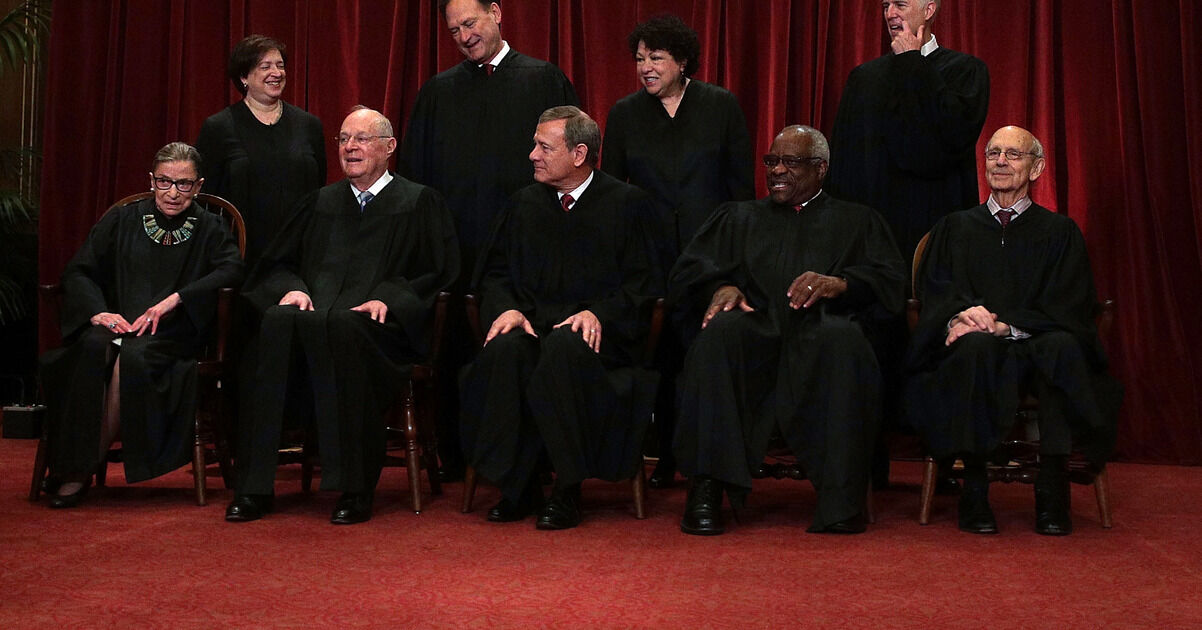Justice Anthony Kennedy isn’t going anywhere.
The 81-year-old justice was widely rumored to be retiring this year, triggering panic among members of the LGBTQ community that his departure would allow President Donald Trump to pack the bench with conservatives who would rollback equality. Kennedy signaled on Tuesday, however, that he plans on sticking around for awhile.
The moderate conservative has hired law clerks for the October 2018 term, as first reported by the legal news website Above the Law.
But Kennedy, the second-eldest member of the bench, was outdone by the Supreme Court’s most senior member. Ruth Bader Ginsburg is staffed all the way through 2020. The 84-year-old has already tapped four clerks for the October 2019 term, which wraps just as the Commander-in-Chief is set to leave office.
Subscribe to get a twice-weekly dose of queer news, updates, and insights from the INTO team.
in Your Inbox
Their continued presence at the Supreme Court is a bulwark for LGBTQ rights at a moment where advocates say protections for queer and trans people are continually under threat by the current administration.
Ginsburg is the most reliably liberal member of SCOTUS, while the centrist Kennedy is often called upon to be crucial a swing vote in a 4-4 deadlock. That power has given the longtime justice a great deal of influence on the bench: He has authored many of the court’s most pivotal rulings on equality.
Kennedy wrote the majority decision in the cases of Lawrence v. Texas, which struck down anti-sodomy laws across the United States; Romer v. Evans, in which the court ruled that statewide bans of LGBTQ nondiscrimination protections were unconstitutional; and a pair of rulings paving the way for marriage equality, United States v. Windsor and Obergefell v. Hodges.
“The history of marriage is one of both continuity and change,” Kennedy wrote in the 2015 decision legalizing same-sex marriage.
“Changes, such as the decline of arranged marriages and the abandonment of the law of coverture, have worked deep transformations in the structure of marriage, affecting aspects of marriage once viewed as essential,” he continued. “These new insights have strengthened, not weakened, the institution.”
Compare this to Trump’s track record of judicial appointments: A third of the judges the president has tapped for U.S. district courts have a marked track record of opposing LGBTQ rights.
His federal appointees include judges who think gay magistrates shouldn’t be allowed to hear cases involving LGBTQ people; have compared same-sex unions to marrying bacon; argued queer and trans workers aren’t protected under civil rights laws; and claimed transgender children were evidence of “Satan’s plan.”
Trump’s only Supreme Court pick so far, Neil Gorsuch, is no LGBTQ rights ally.
The ultra-conservative jurist claimed in his 2004 dissertation that the U.S. Constitution doesn’t guarantee marriage rights to same-sex couples. Gorsuch wrote in a 2005 op-ed for the National Review that liberals are “addicted to the courtroom, relying on judges and lawyers rather than elected leaders and the ballot box, as the primary means of effecting their social agenda,” which he contended included marriage equality.
He has also ruled against a transgender inmate who lobbied for access to hormones and a trans employee’s right to sue for discrimination after being turned away from the women’s bathroom at her workplace.
The Supreme Court will issue its ruling on Masterpiece Cakeshop v. Colorado Civil Rights Commission in June, in which a Christian baker is arguing for the right to turn away same-sex couples on the basis of his religious beliefs. Contrary to his pro-LGBTQ history, Kennedy appeared sympathetic to those claims during oral arguments in December.
SCOTUS could also hear Zarda v. Altitude Express this year, in which a gay skydiving instructor claims he was fired based on his sexual orientation.
Image via Getty












